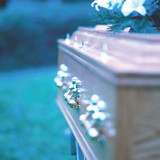The Crone and I
I am a widow, and the word feels alien but good. I accept and fiercely hold onto the label, because this particular label marks my condition, and my widowhood is a condition. Body rhythms slow, life flat-lines, and everything feels wrong. I no longer recognize myself. My hair grows long and gray, my spine hunches, and my skin is deeply etched with tears. I am now Crone.
In Crone’s world, laughter is replaced with silence, and time is measured in se-conds. Daily routine is completely demolished. There is no purpose. Crone sleeps alone, gets up alone, eats alone, drives alone, and watches television alone. Conversa-tions occur only in Crone’s head; little ghosts play out the past, re-living our final days, hours, and minutes. The night before Daniel flew away, the moment before bed, dinner the week before, last Christmas, the screen door closing that last morning. The com-mon ingredient being the “past.” All dialogue replayed takes place before the day of the crash. Ghost relationships have no future. Catching a glimpse of myself in the mirror, someone I don’t know stares back.
The past is held together by the now archaic world of home. Like a size two dress, it simply doesn’t fit anymore. Whirlwind makeovers and reappraisals are required. Crone wages war on my surroundings.
Daniel is gone, and so his desk must be moved. The desk weighs 150 pounds. “Dissemble it, stack up the drawers, remove the roll top, now!” One inch at a time. Crone pushes that maple and marble thing across the carpet and into the opposite corner.
“There’s Daniel’s chair. Move the damn thing into another room. Now!” yells Crone.
The two-ton sofa is in the wrong place. “Take all the pillows off. Put cardboard under the wooden feet, and move the blasted thing.” I become a human lever. I sit down on the floor, my back to the sofa, pressing my feet up against the wall, and push and push. Presto. Crone is satisfied. Nothing inside the walls of that house is safe. Nothing is too heavy or too large. The furniture is vibrating with anxiety about being dumped into a new location, and inevitably the phone rings, “Is Dan Weber there?” “NO!”
Back to the furniture. The perfect table that we both shopped for and loved, is now an elephant in the dining room, too big, too expensive to give away, intended to be an heirloom. “I hate it! Turn it. Cover it up, just do something!” The carpet belongs in someone else’s house. “Rip it out!” A king size bed is still living in the bedroom. “How can I sleep in that?” No choice. Damn, I can’t move the washing machine.
“And that bathroom!” A week ago Daniel stood in the bathtub fixing the large mirror that hung above the tub. Maybe his footprints are still in the tub. “Save them!” In the process of moving furniture, the goal morphs into finding more evidence, more proof of Daniel’s existence. Lying on the back of the sofa is a stray hair. Daniel left it behind. “Save it!” cries Crone. I carefully slide the hair into a zip lock bag. Small hairs from Daniel’s shaver show up in his toiletry bag. “Save them!” “Hunt for skin cells, finger nails, and stray hairs.” Thank God for zip lock bags!
Exhaustion pours over me, and Crone and I fall into the waiting arms of the closet. Wrapping up in Daniel’s blue and green striped polo shirt, draping his shirtsleeves around my neck, and nestling in between his shoes, I can breathe him in deeply and cry.
I don’t realize that the house and I are changing. Evolving. And it is happening fast. I am now living in a snow globe world, and everything taking place within its glass dome is about me and Daniel. Nothing else. Peering through curved glass, I witness a world at odds with mine. The perpetual motion of everyday life. Unmarked life. When I emerge from my globe to face a world populated with people whose lives have not changed, I’m truly frightened. I am afraid of people’s reaction to me, and my reaction to them. I am terrified of seeing friends or relatives of the other victims of the crash. What can I do or say? I feel so guilty. Somehow, I should have stopped the crash. Or I should be dead too.
The outside world is quickly peppered with mines. The grocery store, our is-land’s main street, the bank, the post office -- a damned mine field at every step. Explosions come at any moment in the form of very well-meaning people, self-protective people who jump into their cars for a quick get-away, and tender-hearted souls who want to give big bear hugs and offer comfort. People are so incredibly kind, but I am traumatized and often mistake concern and caring for curiosity or blame. I am an accident on the side of the road. Gazillions of cars are slowing down to stare at me. Every-one knows that tragedy is fascinating.
Grief presses into my face, radiates on my skin, and pools in my eyes. Everyone can see the state I am in. That’s what I think. I feel so exposed. Transparent. If only I could disappear. In other times and places death called for black. A lot of black. The widow shrouded herself in black. Black hats with black veils screened intruders. The entrance to the home was adorned with black. Everyone affected wore uniforms of black arm bands, closed the curtains, and stayed tucked behind closed doors, until a suitable period of mourning had passed. The widow had a specific job to do, grieve, and the darkness of the act reflected the darkness of the surroundings. Within such a fortress perhaps I could adjust, regroup, and sort it all out. No explanations. Everyone keeping a respectful distance. That’s what I think.
So I cleverly choose a new look, retro-mourning. Like women of the past, I take to wearing shades of black -- the beautiful, opaque non-color that absorbs all light: black coat, black pants, black shoes, black skirt, black sweater, and black purse. I cover my eyes with dark sunglasses. Shades. I wear them in the rain; in the winter, through the spring and summer and fall; and into the future for several years. With my shades pulled down and tucked tightly in place, I can actually go to the grocery store. The community will be at arms’ length. No one will see the depth of my grief. My guilt. After all, being alive is almost embarrassing. I walk around breathing, and four innocent men are dead. Why not me? I’d flown in the same plane a few days before. What about me?
In the privacy of home, I shove my world around, comb my long grey hair, and live within my snow globe tomb. Wearing my uniform of black, I am a shadow of my former self. Unrecognizable. I venture out into an unsafe world but somehow manage to survive.
----------------------------------------------------------------------------------------
About the Author
Susan Williams lives on the remote isle of San Juan in the Salish Sea in Washington State. The Crone and I is the third chapter of her memoir, Shades of Grief, to be published in 2018.
Susan’s creative pulse centers on her passion for the arts. Sculpture, painting, dramatic arts, and writing fill her days and each one has been influenced by her journey with grief. She is currently working on an adventure story for young readers.
Susan’s sculpture and writing were recently featured in Art Doll Magazine. If you are interested in viewing her artwork go to rosebladeart.com.




